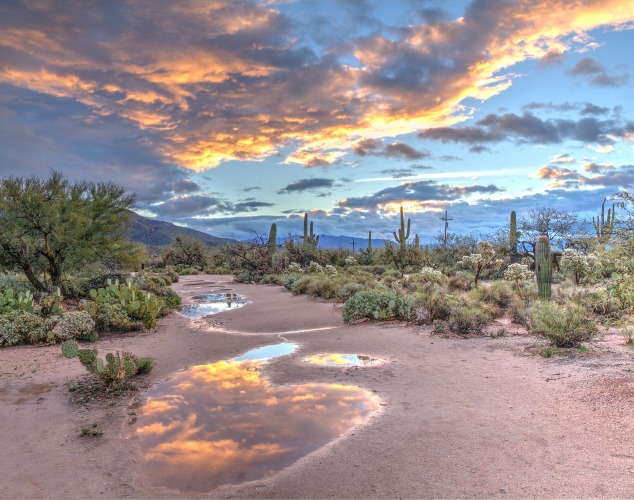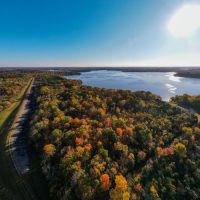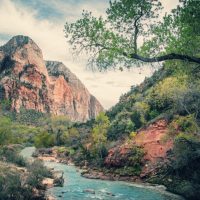Arizona has not made the top 10 list of states where alligators exist.
Does this mean they never show up here?
Contents
So… Are There Alligators in Arizona?
If I were an alligator, I’d consider Arizona as a place to retire.
However, I am not sure I’d find enough swampland or shallow bodies of water where I’d be able to soak myself and watch for prey.
The National Parks Conservation Association says that alligators do live in the southeastern United States.
However, their “range doesn’t extend to the Arizona desert.”
See, the desert provides only one-half of what I believe an alligator needs to survive.
It has the warmth that this large reptile normally craves, although they can survive in colder weather too.
Either way, Arizona is probably too dry for them.
They usually enjoy moist freshwater conditions the best.
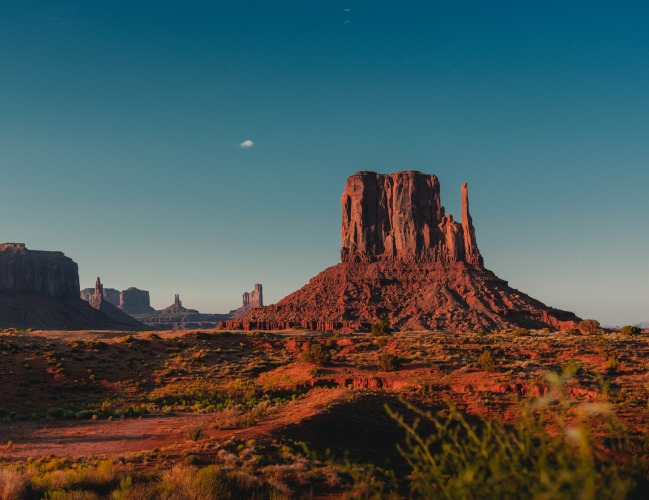
Is it Safe to Swim in Arizona?
Check before you go, but there are at usually least 17 swimming spots in Arizona where you can safely swim.
Some of these include Roper, Alamo, and Patagonia or Lyman Lakes.
Since alligator sightings almost never (if ever) happen here naturally, that’s the least of your concerns if there are any dangers.
You will instead want to think about the water quality.
It’s never a good idea to go into a body of water unless you know how to test it yourself or you have confirmed reading safety reports.
You also have to know how to prepare your body for cooler water temperatures in contrast to the hot Arizona air.
Otherwise, you could shock your body.
It’s also wise to stay hydrated even if spending time in the water, which can keep you cool but not cool enough to quench your thirst.
After all, hydration doesn’t usually happen by osmosis or transdermally (through the skin).
Make sure you bring a supply of drinkable water with you to beat the AZ sun, even when at a swimming hole.
Alligator Species in Arizona
The only alligator that exists in the United States is the American Alligator.
The only other crocodilian creature besides the caiman that looks most like it is the American Crocodile.
Neither the alligator nor the crocodile shows up in Arizona much.
If they do cross over here, and it’s not just some story someone concocted, it may have happened because someone had a pet that escaped.
These large reptiles do, however, travel from other states from time to time.
The closest states where an alligator may have entered Arizona (if it did) is either Texas or Oklahoma, and both of these are still hundreds of miles away.
Otherwise, they would have to travel along the Colorado River.
Interesting Alligator Facts in Arizona
I chuckled when reading about some of the supposed alligator sightings reported since 2005.
I have a hard time deciphering what’s true and what’s not.
One story from this period may be true as described by The Spectrum in 2016.
I do believe that a 9-foot alligator was found and removed from the Pakoon Springs Pond in 2005.
This body of water is watched by the Bureau of Land Management.
Most of the alligators found near Arizona are usually spotted in Southern Utah.
Otherwise, they’re spotted right on the border of both states.
However, I have also learned of the top 10 states where the alligator population is the highest, and neither AZ nor Utah is on the list.
That’s what makes me wonder.
Who’s telling the truth?
I generally do trust newspapers that have a reputation for reporting things that did happen though.
However, even the most sincere publications can get it wrong sometimes.
Even if alligator sightings rarely happen in Arizona – if ever – the fact that they don’t happen all the time doesn’t mean they couldn’t.
As the world climates change, that can cause northern climates to warm up and motivate animals to move away from the scorching equator heat.
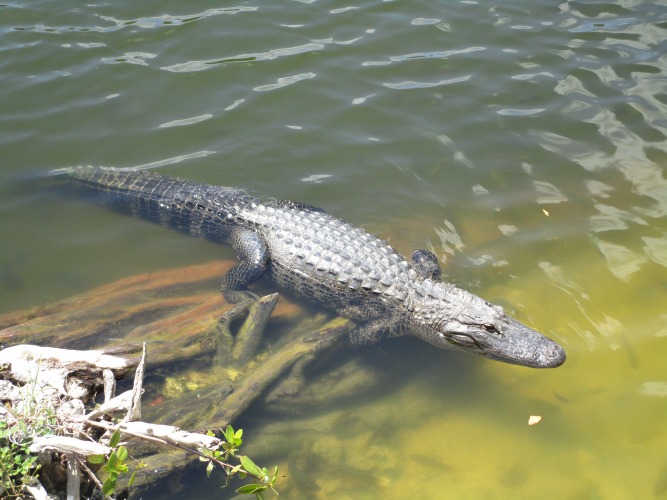
More Alligator Facts
Alligators move an average of about half a mile (.7 kilometers) to about two miles (3.2 kilometers) a day.
I found out they can run as fast as 30-35 miles per hour though.
One of the most fascinating facts to me is that they can go two to three years without eating.
I think the longest I ever fasted solid food (still drank water) was about three days.
I also felt amazed when I heard that an alligator had held its breath for as long as 24 hours.
The average, however, is several minutes, with many of them not breathing for 10-20 minutes.
That’s still way longer than the 30-60 seconds I could hold my breath.
I never had the chance to watch alligators up close.
However, I like the way their eyes pop out on the top of the water.
They can remain hidden, so their prey doesn’t see them.
I just hope I never end up becoming one of their potential prey.
The good news is, alligators are usually content with whatever food they can find.
They’ll eat birds, frogs, turtles, lizards, fish or snakes, and insects, for instance.
By the time they have met me, I’m sure they won’t eat me – or eat you if you meet one.
Alligators Vs Crocodiles
For the longest time, I didn’t know the difference.
In fact, I thought that alligators and crocodiles were the same things but that everyone calls them by different names.
It turns out they’re two different species of animal.
Alligators appear almost black in color, but they do have a light underside.
Crocodiles likely have tan and/or olive hues, and they also have a light belly, usually a cream color.
After some study, I now know that crocs show off more teeth than gators do.
I wouldn’t want to go near either in person, but their forced “smiles” always make me laugh a little inside.
They look happy even if that’s just their natural resting face.
Anyway, about the weight of alligators versus crocodiles: Alligators don’t usually weigh more than 500-800 points – 1,000 maximum.
Crocodiles can weigh as many as 2,200 pounds but average about 1,000 pounds.
This figure represents adult males, and the adult females are lighter.
Alligators also don’t grow as long as a crocodile does.
They may grow to about 10-15 feet maximum, but a crocodile can make it to more than 20 feet long.
Height and weight vary quite a bit for both gators and crocs though.
As far as head shape, an alligator’s is wider and rounder than a crocodile’s.
Crocodiles have a point and are longer.
For habitats, the alligators usually prefer freshwater versus saltwater.
In fact, they’d be in trouble if they try to survive very long in saltwater because their respiratory system doesn’t allow it.
That doesn’t mean they can’t adapt if they want to survive, but that’s the status quo.
Crocodiles, on the other hand, their breathing systems are designed for processing salt.
Therefore, you’re more likely to see them near an ocean than you would an alligator.
5 Safety Tips for Swimming in Alligator-Infested Waters
The first one I can think of is to stop reading horror stories about alligator attacks.
If they’re set in Arizona, most of them are not true.
Stick to warnings given by local authorities and wildlife refugees, not fake news sites or fiction books.
Your likelihood of swimming in alligator-infested waters is probably about as unlikely as having the chance of seeing Hailey’s comet.
(That comet only makes an appearance once in about 75 years.)
Still, pay attention to swimming safety tips.
1. Wear a lifejacket in deep waters.
This could save you even if you know how to swim.
It will prevent you from strong currents if one were to ever occur.
If you decide to swim alone, which I don’t recommend, it can provide you some assurance you’ll make it back to shore in one piece and alive.
2. Don’t swim by yourself, especially after dark.
This will usually apply to people not thinking straight.
Perhaps they consumed a little too much alcohol and have their guard down.
Whatever the reason you want to swim now, don’t swim alone, especially after dark.
It’s hard to tell where you’re going in places that have no overhead lights.
You never know what you could encounter.
3. Swim sober.
This has nothing to do with AZ specifically.
I just happened to notice some advice about not swimming under the influence of alcohol.
I am sure that this applies to using marijuana or if you know if using prescription medications could impair your judgment.
You may not be as aware of your surroundings if not sober, so swim sober.
4. Don’t disobey signs.
If a sign says “no swimming.”
Don’t assume you’re above the law or that you’re smarter than the people who’ve lived in a location all their lives
. It could be uranium in that water for all you know.
You don’t want to take a chance.
5. Wear protective equipment.
You may not always need goggles or masks when swimming.
However, they can reduce the chance of catching a waterborne disease.
If a dangerous animal does come near you, face protection could also prevent you from losing an eye.
Arizona Safety Overview
READ THE FULL REPORT: Arizona Safety Review
Safety Index:
- OVERALL RISK: LOW
- TRANSPORT & TAXIS RISK: LOW
- PICKPOCKETS RISK: MEDIUM
- NATURAL DISASTERS RISK: HIGH
- MUGGING RISK: MEDIUM
- TERRORISM RISK: LOW
- SCAMS RISK: LOW
- WOMEN TRAVELERS RISK: LOW
Frequently Asked Questions
What is the alligator's ideal climate?
They typically feel most comfortable between 82-92 degrees F.
However, they still do survive when it’s 70 degrees and become dormant (hibernate) at about 55 degrees.
How long do alligators live?
They can live about 30-50 years.
This depends on the conditions, such as expected weather or inclement conditions.
If they live in a hunting zone, that could shorten their lifespan (of course!).
Are alligators endangered?
Because of past hunting practices and limited environments where alligators survive, they have become endangered.
There used to be a total of eight species, and now there are only two still alive today.
These include the American and Chinese Alligators.
Can an alligator survive in Arizona?
It probably could if it had to.
It may require setting up an artificial habitat, such as an indoor aquarium or refuge.
They’re used to spending their time in the water, and it would be hard for them to live in a desert where water is sparse.
Can you have a pet alligator in Arizona?
According to one law office, no crocodilian creature, including an alligator, crocodile, or caiman is allowed for use as a residential pet.
If someone has smuggled one into the state, that’s probably the reason for the alligator stories.
Any existence of them in this state is more than likely illegal unless an alligator has wandered just a little too far from its native habitat.
